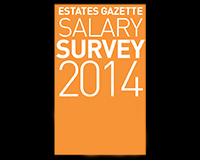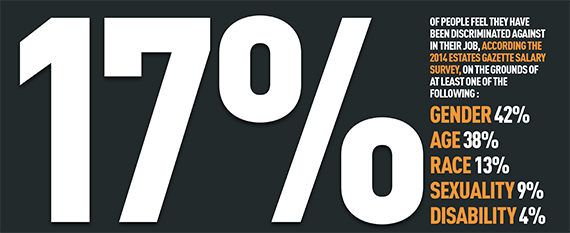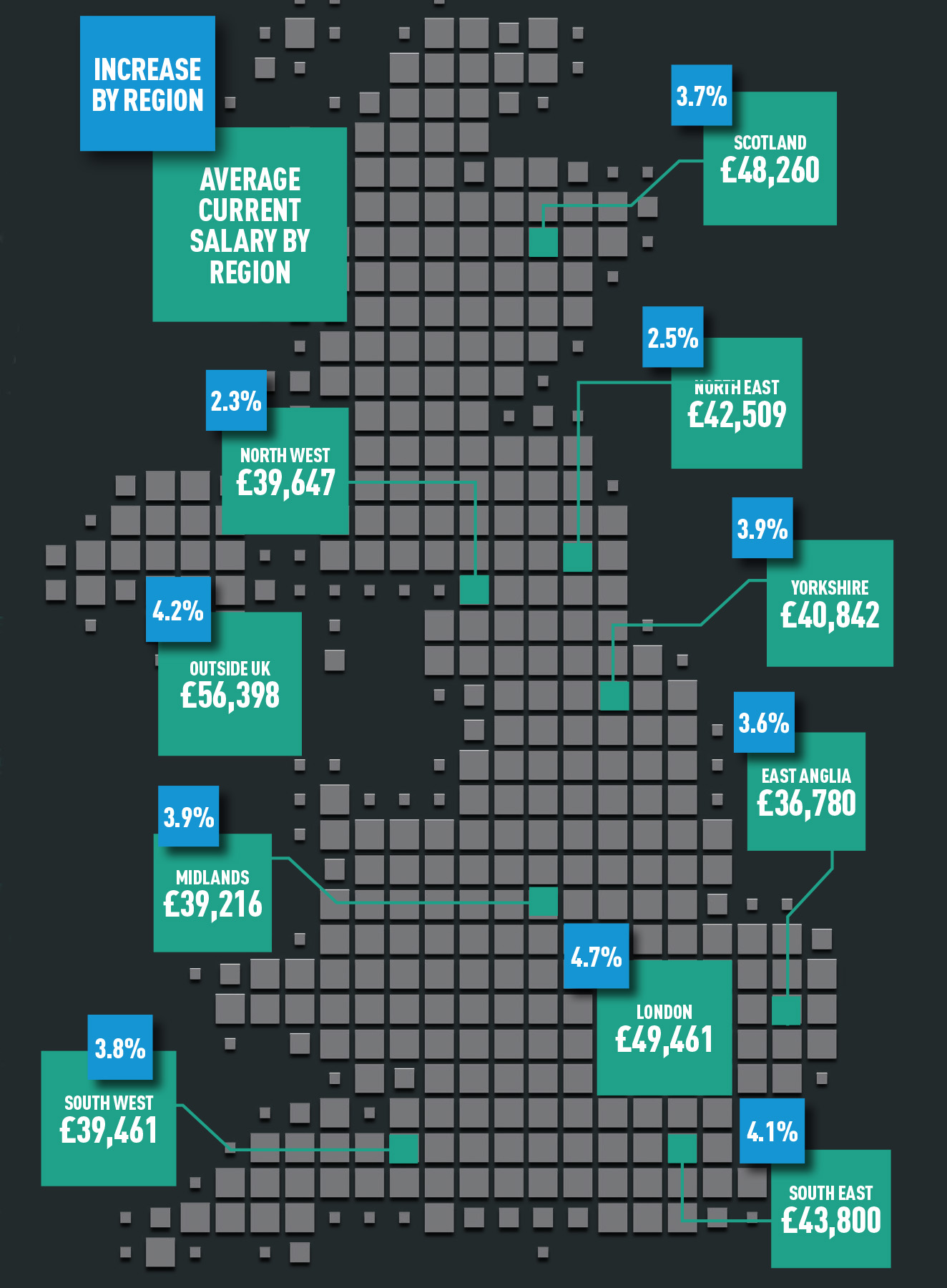It’s not all about the money. This year’s EG Salary Survey, in association with Cobalt Recruitment, reveals concerns more pressing than pay packets. By Emily Wright
To clarify, 17% is nearly one fifth of the 1,300 people questioned for the Estates Gazette salary survey. That is more than 250 people who feel they have been discriminated against at work.
It is fair to say the property industry doesn’t have the best reputation when it comes to diversity – despite huge steps being taken to rectify what was once far more widespread inequality – but this figure brings the continued severity of the issue into sharp focus.
“My God. Seventeen per cent? We still have such a long way to go,” says Jackie Sadek, policy adviser to cities minister Greg Clark.
David Mann, partner at building consultancy Tuffin Ferraby Taylor and co-founder of Freehold, the networking and support group for LGBT real estate professionals, adds that the issue becomes particularly concerning when there is a potential link – whether real or perceived – between discrimination and salaries.
“People who are not progressing up the career ladder or feel in some way undervalued tend to look at themselves to try to work out why that discrimination is happening,” he says.
“If there is something different about you – your ethnicity, your sexuality – you may believe it has something to do with that.”
And it isn’t just diversity that produced headline-grabbing figures this year. After five consecutive years of salary surveys focusing on the money – or lack thereof – between 2009 and 2011, a more settled 2014 looks to have given the industry some pause for thought across the board. For the first year in the survey’s 23-year history, salary was not listed as the most important element of most respondents’ job – coming second to “challenging and interesting work” (see table overleaf).
Last year, respondents were buzzing over £5,000 salary hikes fresh off the back of a renewed upswing, and the return of the bonus. But,12 months on, against the backdrop of a more modest rise of less than £1,000 from an average salary of £47,065 to £47,228 and a calmer, more secure jobs market, attention has turned to issues such as work/life balance and positivity in the workplace. “After last year’s focus on pay rises, it is encouraging for the industry that people are now more focused on interesting and challenging work. This can only benefit productivity and success,” says Christopher Mackenzie, UK director of Cobalt Recruitment.
“As for the statistics on diversity, we have had more than one individual register with us this year because they were told the timing of them having children would hinder their promotion opportunities.
“But more positively, we have also had increasing requests over the past 12 months from clients asking for a more diverse candidate pool to choose from, particularly regarding socio-economic background and gender.”
Over the next four pages we drill down into the data to reveal how the UK property sector feels about working in the industry in 2014-15, as well as uncovering the hotly anticipated stats around bonuses, pay increases and which regions and areas of work have seen the biggest salary hikes over the past year.
“Equality in the workplace? It’s a fundamental human right”
In a less frenetic market, respondents revealed it is not just cold hard cash that drives them at work. Acceptance and equality are crucial if the property industry is to shake a poor reputation for promoting diversity. But first… a look at those modest salary increases
Little by little…
A small increase in average salaries may not be what everyone had hoped for after the dramatic spike last year, but some might argue that a measured market is good news for longer-lasting growth. Measured certainly seems to be the case when it comes to pay packets, with an average growth of less than £1,000. Commercial development netted the highest average salaries at nearly £60,000, followed by corporate real estate and portfolio/asset management.
I didn’t want to be known as ‘the gay surveyor’
David Mann, co-founder of Freehold “Property is not always perceived as an attractive industry for anyone who is different.
But things are changing. Groups like Freehold give the gay community more transparency and some industry role models. And that helps anyone looking at joining the industry as well as some more senior people who now have more confidence about coming out and being themselves at work – which is a fundamental human right.
I have always been out at work but not always to my clients. Then you end up in a situation where you are skirting around the details of your personal life or being vague when you are talking about your partner, unless you decide to tell whoever you are talking to – which is, in effect, like coming out every single time. And you never know how people will react, though I am pleased to say that most of the reactions I have had have been absolutely fine.
When I started Freehold I was really nervous. I didn’t necessarily want to be the first building surveyor to come out so publicly. I don’t want to be known as ‘the gay surveyor’. I want to be known as a good surveyor.
But now we have over 600 members and support from the RICS, RIBA, BPF plus major property companies which have helped us by hosting and holding events. Compared with five years ago things already look very different. Companies like Cluttons, CBRE and JLL didn’t even think they had a problem back then, now they are biting our hands off to support diversity, ultimately to be part of a wave of change that is happening in property – certainly in relation to LGBT issues and equality.”
This is a real wake-up call
Elizabeth Slattery, partner, UK head of employment, Hogan Lovells “The survey results, indicating that a significant number of employees feel that they are discriminated against because of a protected characteristic, is a real wake-up call for employers in the industry.
Firms should be giving careful thought to how to respond to these concerns. Failure to do so could result in tribunal claims from individual employees; successful claims can mean substantial compensation awards as well as recommendations that an employer should take particular steps, such as workforce training or changes to procedures, to remove or reduce the discrimination that has occurred.
Although the survey results do not specifically address how far concerns about discrimination relate to pay, given the context of the survey employers will want to think seriously about the risk of equal pay claims. Employers that lose equal pay claims lodged after 1 October 2014 will normally be ordered to carry out an equal pay audit of their workforce. If an employer has carried out a recent pay audit voluntarily a tribunal can decide not to make such an order.
Carrying out a pay audit voluntarily also gives firms an opportunity to take action to correct any pay imbalance that is revealed before claims are brought (although can obviously also be used as evidence in any such claims if corrective action is not taken). Tackling equal pay issues early makes sense from a legal and a commercial perspective. Doing so may help head off potential tribunal action as well as the accompanying unwelcome publicity that such claims can generate.”
A long way to go
It is not just the diversity statistics that are a first in this year’s salary survey. Salary was bumped off the top spot for the first time in the survey’s 23-year history. No surprise, though, that women’s salaries still trail those of their male counterparts. And just 18% of those surveyed are satisfied with their work/life balance.
Online vs old school: employers fail to click
Could your online profile be as important as your physical location when it comes to career progression and salary increases? Respondents reveal they are increasingly turning to Linked In and Facebook to up their chances of scoring a new job. But be warned – potential employers might not be on the same wavelength
The social network
There is a clear discrepancy between the way job seekers and potential employers feel about social media, in particular, LinkedIn. Some 22% of respondents say they use it at least once a day and a further 21% once every two to three days. More than half think an updated profile is “very important” when looking for a new job. But just 2% of employers cite LinkedIn as their recruitment method of choice, the lowest of every option including Twitter (5%) and Facebook (3%).
Bonus box
Last year signalled the return of the bonus. Good news again in 2014 as it looks as though it is here to stay. But only for some. In fact, like many of the financial-based results this year, responses around bonuses revealed little has changed over the past 12 months after dramatic 2013 hikes. There was just a single percentage point drop in the number of those surveyed who didn’t receive a bonus this year from 41% to 40% – though this did tally almost exactly with the number of respondents who expected one as part of a benefits package. Steady, positive results, but still nowhere near the dizzy heights of the £11,000-plus delights of the early noughties.
40%
of respondents DID NOT receive a bonus in 2013
Rising pay home and away
Little surprise that London topped the league for the biggest salaries in the UK. Neither is it a surprise that the South East followed closely behind in second place. The revelation that Scotland was next on the list may raise a few eyebrows – particularly as the salary survey was filled in around the time of the referendum. As for relocation, nearly a fifth of respondents said they were happy staying put and the majority of those prepared to move would expect a pay rise of between 11% and 20% in return. The reported average overseas salary might not quite fulfil those expectations – but it did come in higher than anywhere in the UK at £56,398.














